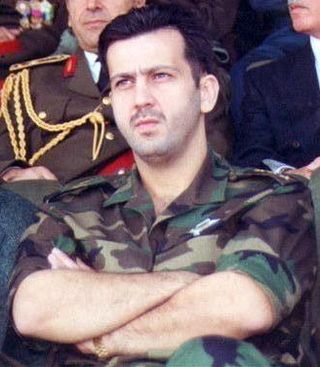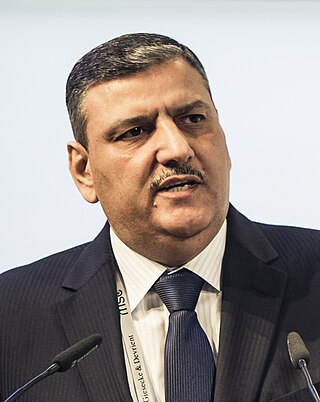Related Research Articles

Bashar Hafez al-Assad is a Syrian politician who has served as the 19th president of Syria since 17 July 2000. In addition, he is the commander-in-chief of the Syrian Armed Forces and the Secretary-General of the Central Command of the Arab Socialist Ba'ath Party, which nominally espouses a neo-Ba'athist ideology. His father and predecessor was General Hafez al-Assad, whose presidency between 1971 to 2000 marked the transfiguration of Syria from a republican state into a dynastic dictatorship tightly controlled by an Alawite-dominated elite composed of the armed forces and the Mukhabarat, who are loyal to the Assad family.

Abdul Halim Khaddam was a Syrian politician who was Vice President of Syria and "High Commissioner" to Lebanon from 1984 to 2005. He was long known as a loyalist of Hafez Assad until he resigned from his position and left the country in 2005 in protest against certain policies of Hafez's son and successor, Bashar Assad. He accumulated substantial wealth while in office: a Credit Suisse account, opened in 1994, was nearly 90 million Swiss francs in September 2003, per Suisse secrets.

Maher al-Assad is a Syrian general and commander of the Republican Guard and the army's elite Fourth Armoured Division, which together with Syria's Military Intelligence form the core of the country's security forces. He is also a member of the Central Committee of the Ba'ath Party's Syrian Regional Branch. He is thought by some to be the second-most powerful man in Syria after his brother Bashar, the current President.

Assef Shawkat was the deputy Minister of Defense of Syria from September 2011 until his death in July 2012.
Hasan Ali Turkmani was a prominent Syrian military commander and Arab Socialist Ba'ath Party member. He served as the minister of defense in Syria from 2004 to 2009.

The al-Assad family, also known as the Assad dynasty, has ruled Syria since General Hafez al-Assad became President of Syria in 1971 under the Ba'ath Party. After his death, in June 2000, he was succeeded by his son Bashar al-Assad.

Bilateral relations between the India and Syria are historic where the two have ancient civilisational ties. Both countries were on the silk route through which civilisational exchanges took place for centuries.
Rami Makhlouf is a Syrian businessman and the maternal cousin of president Bashar al-Assad. At the beginning of the Syrian Civil War in 2011, he was considered to be Syria's richest and one of the most powerful man. According to Syrian analysts, he is part of al-Assad's inner circle and no foreign company could do business in Syria at the time without his consent and partnership.

Wael Nader Al-Halqi is a Syrian politician who was Prime Minister of Syria from 2012 to 2016. Previously he was Minister of Health from 2011 to 2012. He was appointed as Prime Minister on 9 August 2012.

Riyad Farid Hijab is a Syrian politician. He was Prime Minister of Syria from June to August 2012, serving under President Bashar al-Assad. From 2011 to 2012, he was Minister of Agriculture.
International reactions to the Syrian civil war ranged from support for the government to calls for the government to dissolve. The Arab League, United Nations and Western governments in 2011 quickly condemned the Syrian government's response to the protests which later evolved into the Syrian civil war as overly heavy-handed and violent. Many Middle Eastern governments initially expressed support for the government and its "security measures", but as the death toll mounted, especially in Hama, they switched to a more balanced approach, criticizing violence from both government and protesters. Russia and China vetoed two attempts at United Nations Security Council sanctions against the Syrian government.
The following is a timeline of the Syrian uprising from September to December 2011. This period saw the uprising take on many of the characteristics of a civil war, according to several outside observers, including the United Nations Commission on Human Rights, as armed elements became better organized and began carrying out successful attacks in retaliation for the ongoing crackdown by the Syrian government on demonstrators and defectors.
Riad Mousa al-Asaad is a Syrian military commander, politician who is the founding leader of the Free Syrian Army. One of the prominent faces of the Syrian Revolution, he led the armed resistance to the Assad regime as commander-in-chief of FSA, during the early phase of the Syrian Civil War. Under Riad al-Asaad's command, FSA expanded into a para-military force of 75,000 guerillas and insurgents in March 2012; capable of ousting regime forces from Damascus. He currently serves as the Deputy Prime Minister for Military Affairs of the Syrian Salvation Government, a position he has held since 2 November 2017. He was a former Colonel in the Syrian Air Force who defected to the opposition in July 2011 and became the first Acting Commander-in-chief of the Free Syrian Army.

Qadri Jamil is a Syrian politician, media editor and economist. He is one of the top leaders of the People's Will Party and the Popular Front for Change and Liberation, and a former member of the Syrian government, having been dismissed from the post of deputy prime minister for economic affairs; minister of internal trade and consumer Protection on 29 October 2013. During a visit to Russia on 21 August 2012 Jamil said that President Bashar Assad's resignation might be considered if the opposition agreed to negotiate a peaceful settlement to the Syrian revolution.
Manaf Tlass or Manaf Tlas is a former Brigadier General of the Syrian Republican Guard and member of Bashar al-Assad's inner circle who defected in 2012. He was the first Syrian Republican Guard commander to defect from the Syrian military and declare support for the opposition.
Nawaf al-Fares is the former Syrian ambassador to Iraq who defected from the ruling government led by Bashar al-Assad on 11o July 2012 during the Syrian uprising.

Ahmad Moaz Al-Khatib Al-Hasani is a former president of the National Coalition for Syrian Revolutionary and Opposition Forces. He is also a former imam of the Umayyad Mosque in Damascus.
Adnan Abdo Al Sukhni is a Syrian politician who has been serving as industry minister since August 2012.

The Syrian Revolution, also known as the Syrian Revolution of Dignity was the early stage of protests – with subsequent violent reaction by the Syrian Arab Republic – lasting from March to 28 July 2011, as part of the wider Arab Spring in the Arab world. The uprising, which demanded democratic reforms, evolved from initially minor protests, beginning as early as January 2011 and transformed into massive protests in March. The uprising was marked by massive anti-government opposition demonstrations against the Ba'athist dictatorship of Bashar al-Assad, meeting with police and military violence, massive arrests and a brutal crackdown, resulting in thousands of deaths and tens of thousands wounded.
References
- ↑ Abbas was appointed as general manager of public Petroleum establishment, Husameddin for oil refinery, and Waddaa for Syrian Gas Archived March 13, 2012, at the Wayback Machine , Syrian Oil and Gas News, 12 March 2009.
- ↑ A decree to appoint Eng. Abdu Hussameddin aide to the Oil Minister Archived March 13, 2012, at the Wayback Machine , Syrian Oil & Gas News, 25 August 2009.
- ↑ Adbo Hussameddin's defection announcement (in Arabic). Translated text here
- 1 2 "Syria deputy oil minister resigns to join opposition". BBC. 8 March 2012. Retrieved 27 April 2023.